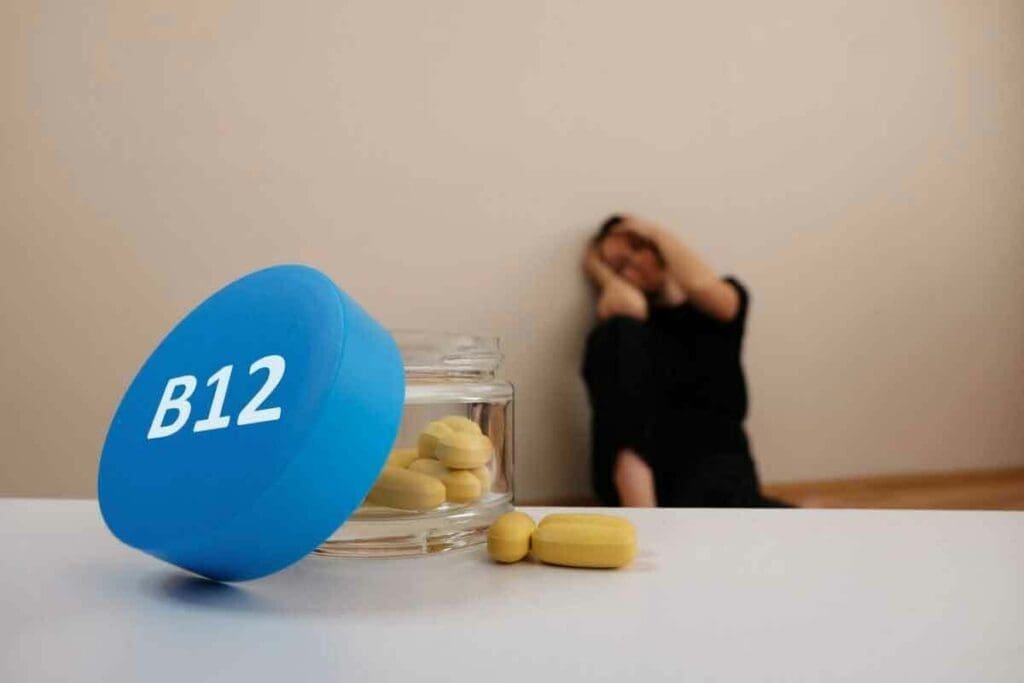Last Updated on November 17, 2025 by Ugurkan Demir

It’s important to understand how low folate acid and vitamin B12 deficiency affect our health. These vitamins are key for making DNA, creating red blood cells, and keeping our nerves healthy. Not having enough can cause serious problems like anemia and nerve issues.
At LivHospital, we stress the need to check your b12 & folate levels. Not having enough of these vitamins can make you very tired, weak, and affect your nerves. The NHS says eating the right foods can help fix these problems. Eating foods high in vitamin B12, like meat and dairy, and folate, like green veggies, can help a lot.

Folate and vitamin B12 are key for our health. They help make red blood cells and keep our nervous system working right. Without enough, we face serious health problems.
Folate, or vitamin B9, is vital for DNA repair and making new cells. It’s essential for making red blood cells and helps cells grow. It’s most important during fast growth times, like when we’re pregnant or babies.
Folate plays a big role in our health. It helps with DNA repair, making red blood cells, and supports growth during pregnancy and infancy.
Vitamin B12 is key for making red blood cells and keeping our nervous system healthy. It helps make myelin, a fatty substance that protects our nerves. Without enough, we can get anemia and nerve problems.
Vitamin B12 supports our nervous system, makes red blood cells, and helps with DNA. A lack of it can cause fatigue, weakness, and nerve issues.
Folate and vitamin B12 work together in our bodies. They help make DNA and red blood cells. If one is low, it can affect the other, causing similar problems like tiredness and nerve issues.
| Nutrient | Role in the Body | Deficiency Symptoms |
| Folate (B9) | DNA synthesis, red blood cell production | Fatigue, weakness, neurological issues |
| Vitamin B12 | Nervous system maintenance, red blood cell production, DNA synthesis | Anemia, neurological problems, fatigue |
Knowing how folate and vitamin B12 work helps us see why we need them. They’re vital for our health and preventing deficiencies.

Folate is key for many body functions and a lack of it can cause serious health problems. It helps make DNA, repair it, and keep red blood cells healthy. Not getting enough folate can happen for many reasons, like not eating enough folate-rich foods or having trouble absorbing it.
Several things can lead to folate deficiency. Inadequate dietary intake is a big one, mainly for those who don’t eat enough folate-rich foods like leafy greens and whole grains. Also, malabsorption from conditions like celiac disease can stop the body from getting folate from food.
Being pregnant also increases the need for folate. Pregnant women need more folate to help their baby grow, making them more likely to be deficient if they don’t eat enough.
Some groups are more likely to have folate deficiency. Pregnant women, as mentioned, need more folate. Others at risk include people with gastrointestinal disorders, those who drink a lot of alcohol, and those on certain medicines like anticonvulsants.
Also, vegans and people with eating disorders might not get enough folate because of their diet.
Folate deficiency can have big effects on health. It can cause folate deficiency anemia, leading to tiredness, weakness, and shortness of breath. It also affects homocysteine metabolism, which is linked to heart disease.
During pregnancy, not enough folate can cause serious problems, like neural tube defects in the baby. So, it’s very important for pregnant women to get enough folate.
Not having enough vitamin B12 and folate can cause megaloblastic anemia. This is when red blood cells are too big.
Megaloblastic anemia happens when DNA making in red blood cells goes wrong. This usually comes from not having enough vitamin B12 or folate. Both are key for making DNA.
“The making of DNA is a complex process,” says experts. “Vitamin B12 and folate are very important in it.”
Without enough vitamin B12 or folate, the bone marrow makes big red blood cells. These cells can’t work right because they can’t divide properly.
This leads to ineffective erythropoiesis. The bone marrow can’t make enough red blood cells. This causes anemia.
Folate deficiency anemia has its own signs, but it’s similar to B12 deficiency anemia. Folate deficiency doesn’t cause the same brain problems as B12 deficiency.
Doctors say, “Folate can fix the blood problems from folate deficiency. But, it’s important to tell it apart from B12 deficiency to treat it right.”
Vitamin B12 and folate deficiencies share similar symptoms, making diagnosis tricky. Both can cause health issues like fatigue and weakness. They also affect the brain and nervous system.
Fatigue and weakness are common in both B12 and folate deficiencies. These vitamins help make red blood cells. Without enough, the body can’t carry oxygen well, leading to tiredness.
Both deficiencies can cause brain and nerve problems. Symptoms include trouble focusing, memory issues, and even nerve damage. It’s hard to tell which deficiency is causing these symptoms without tests.
B12 and folate help make mood-regulating chemicals. Without enough, people might feel depressed or have mood swings. It’s important to check these vitamins in mental health cases.
Some symptoms need quick medical help. These include:
Healthcare providers must know these symptoms. They need to do detailed tests to find the cause.
| Symptom | B12 Deficiency | Folate Deficiency |
| Fatigue and Weakness | Common | Common |
| Cognitive Impairment | Possible | Possible |
| Depression and Mood Changes | Possible | Possible |
| Neurological Symptoms | More Common | Less Common |
It’s key to know the difference between folate and vitamin B12 deficiency for the right treatment. Both can cause fatigue and weakness, but they show different signs in the brain and body.
Vitamin B12 deficiency has more serious brain symptoms. These include:
Folate deficiency doesn’t cause as severe brain symptoms. But, it can lead to mood changes and depression, like vitamin B12 deficiency.
Folate and vitamin B12 deficiency can look similar, making it hard to diagnose. But, some signs are more common in one than the other.
Vitamin B12 deficiency can cause glossitis and skin color changes. Folate deficiency is more likely to cause megaloblastic anemia, with big red blood cells.
It’s very important to tell folate and vitamin B12 deficiency apart because their treatments are different. Vitamin B12 deficiency often needs intramuscular injections of vitamin B12, due to issues like pernicious anemia.
Folate deficiency can usually be treated with oral folate supplements. But, it’s vital to get the right diagnosis. Treating vitamin B12 deficiency with folate can hide symptoms without fixing the brain damage.
We stress the need for accurate diagnosis. This ensures patients get the right treatment for their specific deficiency. This helps avoid long-term health problems.
Vitamin B12 and folate levels are key to our health. Knowing what’s normal is important. These vitamins help make red blood cells and keep our nervous system working right.
For adults, vitamin B12 levels should be between 200-900 pg/mL. Folate levels are measured in ng/mL, with a normal range of 2.5-20 ng/mL. These numbers can change based on the lab and the person’s health.
The Office of Dietary Supplements says it’s key to know these ranges. This helps doctors diagnose and treat problems.
A deficiency happens when we don’t have enough vitamin B12 or folate. For B12, levels below 200 pg/mL are considered low. For folate, levels under 2.5 ng/mL are a sign of deficiency.
| Vitamin | Normal Range | Deficient Level |
| Vitamin B12 | 200-900 pg/mL | < 200 pg/mL |
| Folate | 2.5-20 ng/mL | < 2.5 ng/mL |
Borderline results can be tricky to understand. Symptoms, medical history, and other lab results are important. Sometimes, more tests are needed to figure out what’s going on.
“The diagnosis of vitamin B12 deficiency can be complex, requiring a combination of clinical evaluation and laboratory testing.” –
medical journal
It’s important to understand vitamin B12 and folate levels well. This helps doctors make the right decisions. They use a mix of clinical knowledge and lab results to guide treatment.
Iron, B12, and folate are key nutrients that work together in our bodies. They help make red blood cells, DNA, and keep our nervous system healthy.
The way iron, B12, and folate interact is complex. For example, folate and B12 are linked in making DNA and red blood cells. If either is lacking, it can cause megaloblastic anemia, where red blood cells are too big and don’t work right.
Iron is essential for hemoglobin, which carries oxygen in red blood cells. The body needs iron, folate, and B12 to work well together. If any are missing, it can affect how the body uses iron.
Iron and folate deficiencies often happen together, mainly in people with limited diets or high nutritional needs, like pregnant women. This can make anemia worse and lead to serious health issues if not treated.
A study found that iron and folate deficiencies together are a big health problem, mainly in poor countries where people often lack nutrients.
“The presence of one deficiency can often indicate the presence of another, highlighting the need for complete nutritional assessments.”
Testing all three nutrients together is key to finding deficiencies. This might include blood tests for a complete blood count, iron, ferritin, B12, and folate levels.
Using a detailed testing plan helps doctors understand their patients’ nutritional needs. This way, they can create specific treatment plans to fix each deficiency.
Not getting enough B12 and folate can cause lasting harm. This affects many parts of the body. If these issues aren’t fixed, they can really hurt your health and happiness.
Long-term B12 shortage can harm your nerves. Vitamin B12 is key for nerve health. If B12 levels stay low, it can cause permanent nerve damage. This includes:
Early detection is critical to stop these changes. If not treated, B12 shortage can cause serious and permanent nerve damage.
Folate shortage is more than just anemia. Enough folate stops blood homocysteine buildup, which is linked to heart disease. It also helps with mental health, preventing depression and mood swings.
Folate shortage can have big effects on health, not just for the person but also for their children. This is very important for pregnant women, as folate is vital for the baby’s growth.
Early action is key to avoid lasting damage. Early diagnosis and treatment of B12 and folate shortages can stop long-term harm. It can also greatly improve your life quality.
We suggest regular health checks and tests, mainly for those at high risk. This way, any problems can be found and fixed quickly.
Standard tests for B12 and folate levels have big limits. We need new, advanced tests to get it right. Accurate diagnosis is key to treating these deficiencies well and avoiding health problems later.
Standard blood tests are often used first. But, they have big problems. They might not show how much B12 and folate your body really has. Also, what you eat and some medicines can mess with the results.
Key limitations include:
New biomarkers help fix the old test problems. For B12, we have methylmalonic acid (MMA). For both B12 and folate, homocysteine levels are used. These give a clearer picture of vitamin levels.
| Biomarker | Vitamin Deficiency | Significance |
| Methylmalonic Acid (MMA) | B12 | Elevated MMA is a specific indicator of B12 deficiency |
| Homocysteine | B12 and Folate | Elevated homocysteine can indicate deficiency in either B12 or folate |
Sometimes, we need more than just blood tests and biomarkers. Genetic tests can help find why you might be at risk. They can also spot rare issues with vitamin use.
“The use of advanced diagnostic techniques has revolutionized the field of nutritional deficiency diagnosis, enabling healthcare providers to offer more targeted and effective treatments.” – Nutrition Researcher
Managing B12 and folate deficiencies needs a full plan. This includes changing what you eat, taking supplements, and sometimes medical help. We’ll look at the treatment strategies to tackle these issues well.
Changing your diet is key in treating B12 and folate deficiencies. For folate, eating more leafy greens, legumes, and fortified cereals helps. Vitamin B12 is mainly in animal products, so you might need to eat more meat, fish, eggs, and dairy.
If you’re a vegetarian or vegan, look for fortified plant-based milk and cereals for B12. Some foods are fortified with both folate and B12, which is great for those lacking both.
Supplements are often needed to fix deficiencies, even with diet changes. Folate supplements are usually folic acid, and B12 supplements come in cyanocobalamin and methylcobalamin forms.
The right dose of supplements depends on how bad the deficiency is and what the doctor thinks you need. Folate doses are 400 to 1000 mcg daily, and B12 doses are 2.4 to 2.6 mcg for adults, with more for severe cases.
For severe cases, doctors might prescribe medical treatments. Vitamin B12 deficiency often means getting injections, which quickly top up your levels. How often and how much you get depends on your deficiency level and how you respond.
Finding and fixing the reasons for B12 and folate deficiencies is important. This might mean treating other health issues, changing meds that affect nutrient absorption, or making lasting diet changes.
With a complete treatment plan that includes diet changes, supplements, and medical treatments when needed, you can manage B12 and folate deficiencies. This helps improve your health overall.
Keeping B12 and folate levels right is key for good health. We’ve looked at how these nutrients help our bodies and what happens if we don’t have enough. We also talked about why it’s important to act fast when levels drop.
Not having enough B12 and folate can cause big problems like megaloblastic anemia and brain damage. Knowing the signs and how to find out if you’re low is the first step to fixing it.
By knowing the risks and taking action, we can keep our B12 and folate levels where they should be. This helps us stay healthy for a long time. We can do this through what we eat, supplements, or doctor’s help when needed.
Doctors and healthcare teams are very important in helping us stay healthy. They teach us and take care of us in a big way. Together, we can avoid serious health problems and feel better overall.
In short, focusing on B12 and folate is a big part of staying healthy. We urge everyone to talk to their doctors to make sure they’re doing what’s best for their health.
Folate and vitamin B12 are important for making red blood cells and keeping the nervous system healthy. Not having enough of either can cause anemia and neurological issues.
Folate deficiency can happen for several reasons. It might be due to not eating enough folate-rich foods. It could also be because of malabsorption or increased need during pregnancy.
Not having enough B12 and folate can mess up red blood cell production. This leads to megaloblastic anemia. It can also cause fatigue, weakness, and problems with thinking and feeling.
Symptoms include feeling tired, weak, and pale. You might also have shortness of breath. Neurological problems like numbness, tingling, and thinking issues can also occur.
Doctors use blood tests to check B12 and folate levels. More tests might be needed to find out why the levels are low.
Normal B12 levels are between 200-900 pg/mL. Folate levels should be between 2.5-20 ng/mL. Levels outside these ranges might show a deficiency.
Iron, B12, and folate work together to help make healthy red blood cells. Not having enough of any can cause anemia and other health issues.
Without treatment, B12 and folate deficiencies can cause serious problems. These include neurological damage, anemia, and a higher risk of heart disease.
Treatment includes changing your diet, taking supplements, and sometimes medical treatments. The goal is to get your vitamin levels back to normal and ease symptoms.
Both deficiencies can cause similar symptoms. But, B12 deficiency can lead to more severe neurological problems, like neuropathy and cognitive issues.
Yes, B12 supplements can hide a folate deficiency. It’s important to test for both to get the right treatment.
Yes, some groups are at higher risk. These include pregnant women, vegetarians, and people with conditions like celiac disease or Crohn’s disease.
References:
Subscribe to our e-newsletter to stay informed about the latest innovations in the world of health and exclusive offers!